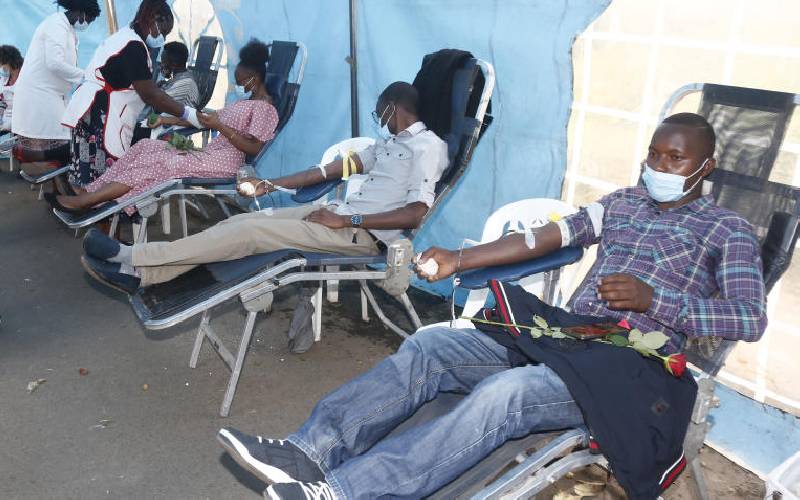
Nakuru residents donating blood as a way of celebrating valentine's day on February 14, 2021.[Kipsang Joseph,Standard]
The World Blood Donor Day is annually observed on June 14 to raise awareness about the need to donate blood regularly to increase the availability of safe blood and its products for patients. This day is also an occasion to thank donors who volunteer to donate the life-saving gift of blood. This also acts as an encouragement for others who are otherwise hesitant to volunteer in the noble.
According to the World Health Organisation (WHO), blood transfusion can potentially save several lives, but many times patients needing transfusion do not have access to safe blood readily. Many times, patients suffering from life-threatening conditions can be saved by blood donation.
For women with pregnancy and childbirth associated bleeding, children with severe anemia, patients with blood and bone marrow disorders, people with traumatic injuries in emergencies, disasters and accidents, and patients undergoing advanced medical and surgical procedures; all need blood and in countries like Kenya, the donation rate is nowhere near sufficient to fulfil all these needs.
The demand versus supply gap when it comes to blood donation is huge in our country. According to the Kenya National Blood Transfusion Service (KNBTS) the official blood needs for the country are 1,000,000 units of blood. This immense requirement can only be fulfilled by voluntary blood donation.
During this year’s World Blood Donor Day the Principal Secretary for Health Susan Mochache highlighted that KNBTS used to collect about 450 pints of blood on a daily basis, but with the onset of Covid-19 disease in the country, the figures dropped by between 70 and 80 per cent.
The PS noted that the demand for blood in the country has gone up mainly because of population growth, accidents and Covid-19 pandemic, which has caused an acute shortage of blood donation, as most people are shying away from the hospitals in fear of contracting the virus.
These persistent low collections have been as a result of various challenges mainly poor donation culture among Kenyans, apathy, negative myths and beliefs and low community awareness on matters of blood.
Few people think about blood until they’re at the hospital in an emergency, and learn the only thing that can save their child, husband, or themselves, from death, is a transfusion of blood. But where does the blood come from? It’s shocking, I know, but blood comes from people. People like you and me.
According to WHO, voluntary non-remunerated blood donation is the surest approach to ensure sufficient supply of safe blood to meet national requirement of blood transfusion. However, only 62 countries have blood supplies based on close to 100 percent voluntary non-remunerated blood donations.
Blood donation systems in most countries largely depend on family replacement donors who donate blood to help a friend or family member in need of blood transfusion.
Blood donation is something Kenyans should consider. Since blood cannot be manufactured outside the body and has a limited shelf life, the supply must constantly be replenished by generous blood donors.
The reason to donate is simple: it helps save lives-which starts with one person making a generous donation to help patients survive surgeries, cancer treatment, Chronic illnesses and traumatic injuries and on average, a person can donate blood after every month.
But did you know that patients aren’t the only ones benefiting from blood donations? Donating blood even once a year can reduce the chances of several heart diseases—mainly heart attack by 88 per cent, according to the study published in the American Journal of Epidemiology. There are also mini check-ups before you donate, including blood pressure and pulse check and according to researchers from the University of California, donating a pint of blood (450 ml) helps your body burn about 650 calories.
Blood donations are thus one of the most important things you can do to help others in need. There is no substitute for blood and your donation could make the difference between life and death for someone else.
Judy Sirima is the communications officer at the Pharmacy and Poisons Board
 The Standard Group Plc is a multi-media organization with investments in media
platforms spanning newspaper print
operations, television, radio broadcasting, digital and online services. The
Standard Group is recognized as a
leading multi-media house in Kenya with a key influence in matters of national
and international interest.
The Standard Group Plc is a multi-media organization with investments in media
platforms spanning newspaper print
operations, television, radio broadcasting, digital and online services. The
Standard Group is recognized as a
leading multi-media house in Kenya with a key influence in matters of national
and international interest.











